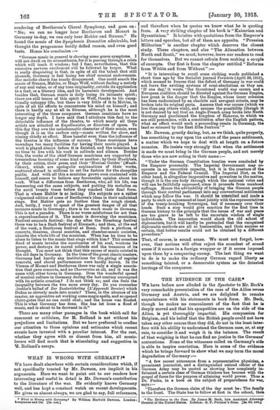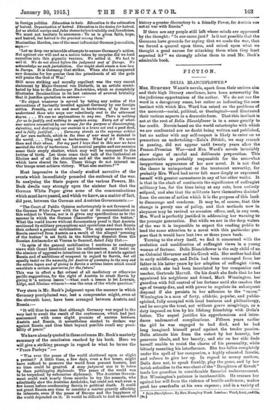THE EVIDENCE IN THE CASE.*
We have before now alluded in the Spectator to Mr. Beck's very remarkable presentation of the case of the Allies verses Germany and Austria, and we are delighted to remake acquaintance with his statements in book form. Mr. Beck, though he makes no concealment of the fact that he is deeply moved and that his sympathies are on the side of the Allies, is yet thoroughly impartial. His compassion for Belgium, and his belief that the British people could not have taken any other course than they did, do not in the least inter- fere with his ability to understand the German case, or, at any rate, to consider it and weigh it in the balance. The result of that weighing is that he can find no justice in the Germans' contentions. None of the witnesses called on Germany's side is able to inspire conviction. Here is some of the evidence which he brings forward to show what we may term the moral degradation of Germany:- " A few recent utterances from a representative physician, a prominent journalist, and a distinguished retired officer of the German Army may be quoted as showing how completely in- fatuated a certain class of German thinkers has become with the gospel of force for the purpose of attaining world power. Thus a Dr. Fuchs, in a book on the subject of preparedness for war, says 'Therefore the German claim of the day must be The family to the front. The State has to follow at first in the school, then • The Evidence in the Case. By Jamas Sc. Beek, late Assistant Attorney. General of the United States, London. G. 7, Butlanes Sons. Ma Bel. ..L) in foreign politics. Education to hate. Education to the estimation of hatred. Organisation of hatred. Education to the desire for hatred. Let us abolish unripe and false shame before brutality andfanaticion. We must not hesitate to announce To us is given faith, hope, and hatred, but hatred is the greatest among them.'
Maximilian Harden, one of tho most influential German journalists, sayer- ' Let us drop our miserable attempts to excuse Germany's action. Hot against our will and as a nation taken by surprise did we hurl ourselves into this gigantic venture. We wilted it. We had to wilt it. We do not stand before the judgment seat of Europe. We acknowledge no such jurisdiction. Our might shalt create a new law in Europe. It is Germany that strikes. When she has oonquered new domains for her genius then the priesthoods of all the gods will praise the God of War.'
Still more striking and morally repellent was the very recent statement by Major-General von Disfurth, in an article contri- buted by him to the Hamburger Nachrichten, which so completely illustrates Bernbardiiam in its last extreme of avowed brutality that it justifies quotation in .tenao — ' No object whatever is served by taking any notice of the accusations of barbarity levelled against Germany by our foreign critics. Frankly, we are and must be barbarians, if by thaw see understand those who wage war relentlessly and to the uttermost degree. . . We owe no ceptanations to any one. There is nothing for us to justify and nothing to captain away. Every act of what- ever nature committed by our troops for the purpose of discouraging, defeating. and destroying our enemies is a brave set and a good deed, and is funky justified. . . . Germany stands as the supreme arbiter e her own methods, which in the time of war must be dictated to the world. . . . They call us barbarians. What of it? We scorn them and their abuse. For my part I hope that in this war we have merited the title of barbarians. Lot neutral peoples and our enemies eease their empty chatter, which may well be compared to the twitter of birds. Let them cease their talk of the Cathedral at Rheims and of all the churches and all the castles in France which have shared its fate. These things do not interest us. Our troops must achieve victory. What else matters ?'" Moat impressive is the closely studied narrative of the events which immediately preceded the outbreak of the war. In analysing the State papers of the various Powers, Mr. Beck dwells very strongly upon the sinister fact that the German White Paper gives none of the communications which must have passed, and which we know, as a matter of fact, did pass, between the German and Austrian Governments :— " The Court of Public Opinion unfortunately is not favoured in the German White Paper with the text of its communication on this subject to Vienna, nor is it given any specifications as to the manner in which the German Chancellor 'pressed the button.' What the world knows without documentary proof is that Austria continued its military preparations and operations and that Russia then ordered a general mobilisation. The only assurance which Russia received from Austria as a result of the alleged pressing of the button' is set forth in the following dispatch from the Russian Ambassador at Vienna to Sasonof, dated July Slat:— ' In spite of the general mobilization I continue to exchange views with Coma Berchtold and his collaborators. All insist on the alisence of aggressive intentions on the part of Austria against Russia and of ambitions of conquest in regard to Servia, but all equally insist on the necessity for Austria of pursuing to the very end the action begun and of giving to Bervia a serious lesson which would constitute a certain guarantee for thefuture.'
This was in effect a flat refusal of all mediatory or otherwise pacific suggestions, for the right of Austria to crush Servia by giving it 'a serious lesson'—what such a lesson is let Louvain, Lite, and Rheima witness!—was the crux of the whole question."
Very stern is Mr. Beck's judgment upon the manner in which Germany precipitated war, lest a compromise might, even at the eleventh hour, have been arranged between Austria and Russia :— " It will thus be seen that although Germany was urged to the very last to await the result of the conferences, which had just commenced with some slight promise of success between Austria and Russia, it nevertheless elected to declare war against Russia and thus blast beyond possible recall any possi- bility of peace."
We have already quoted in these col u mns Mr. Beck's masterly summary of the conclusion reached by his book. Here we will give a striking passage in regard to what be terms the "Peace Parleys "
" Was ever the peace of the world shattered upon so slight a pretext? A little time, a few days, even a few hours, might have sufficed to preserve the world from present horrors, but no time could be granted. A snap judgment was to be taken by these pettifogging diplomats. The peace of the world was to be torpedoed by submarine diplomacy. The Austrian Govern- ment could wait nearly three months to try the aseassin, who admittedly slew the Austrian Archduke, but could not wait even a few hours before condemning Servia to political death. It could not grant R11813ia any time to consider a matter gravely affecting its interests, even if the peace of Europe and the happiness of the world depended on it. It would be difficult to find in recorded history a greater discourtesy to a friendly Power, for Austria was not at war with Russia."
If there are any people still left whose minds ere oppressed by the thought : "Is our cause just ? In it not possible that the Germane have grounds for saying that we made the war, that we forced a quarrel upon them, and seized upon what we thought a good excuse for attacking them -when they least expected it?" we strongly advise them to read Mr. Beck's admirable book.



















































 Previous page
Previous page